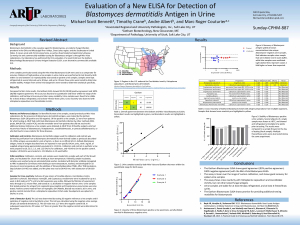Gotham Biotech’s Histoplasma Urinary Antigen EIA Kit Now Available for Purchase as Histoplasma Spreads in the U.S.
Histoplasmosis is a systemic disease caused by the thermally dimorphic fungus Histoplasma capsulatum. H. capsulatum is distributed worldwide and endemic to the Ohio and Mississippi River Valleys, where the CDC estimates 60% to 90% of people who live in the region have been exposed to the fungus at some point during their life, and to certain regions of Central and South America. Medicare records from 2007 to 2016 have found cases of histoplasmosis have now spread to 47 states and Washington, DC.

Portland, ME, February 15, 2024 --(PR.com)-- The Gotham Biotech Histoplasma Urinary Antigen EIA is an enzyme immunoassay (EIA) intended to qualitatively detect the presence of Histoplasma capsulatum galactomannan antigen in human urine specimens. This kit, when used in conjunction with other diagnostic measures, can be used as an aid in the diagnosis of histoplasmosis which is spreading in the United States.
Histoplasmosis is a systemic disease caused by the thermally dimorphic fungus Histoplasma capsulatum. H. capsulatum is distributed worldwide and endemic to the Ohio and Mississippi River Valleys in the United States, where the CDC estimates 60% to 90% of people who live in the region have been exposed to the fungus at some point during their lifetime, and to certain regions of Central and South America. Medicare records from 2007 to 2016 have found cases of histoplasmosis have now spread to 47 states and Washington, DC.
Histoplasmosis is most common among patients positive for HIV or otherwise have a compromised immune system. It is especially a problem in regions of the world where antiretroviral therapy (ART) is not widely available, as ART prevents HIV- infected people from reaching the stage where they are especially vulnerable to histoplasmosis and other opportunistic infections. In Latin America, histoplasmosis is one of the most common opportunistic infections among people living with HIV. There is a 30% mortality rate among HIV/AIDS patients also diagnosed with Histoplasmosis.
H. capsulatum is typically transmitted by the inhalation of microconidia by the host, deposition in the alveoli, and rapid conversion to a parasitic yeast form in host tissues. Infection is typically asymptomatic. Among immunocompetent hosts in endemic areas, 95-99% of the primary infections are not recognized or detected . Because the symptoms of histoplasmosis have significant clinical overlap with other diseases, the definitive diagnosis of histoplasmosis requires either isolation of H. capsulatum from a clinical specimen or direct visualization of the yeast form in clinical specimens. These procedures may require invasive measures to obtain tissues and cultures may take up to six weeks to reveal fungal growth. In contrast, enzyme immunoassays (EIAs) detect H. capsulatum polysaccharide antigen in bodily fluids including urine and blood. Such tests provide rapid results and reasonable specificity and sensitivity and may be used to supplement culture and microscopic examination to diagnose histoplasmosis.
The Gotham Biotech Histoplasma Urinary Antigen EIA incorporates the principle of a solid phase enzyme-linked immunosorbent assay. The assay system utilizes a unique pair of monoclonal antibodies that are specific to distinct epitopes of intact galactomannan molecule antigen. Capture rabbit monoclonal anti-galactomannan antibody is immobilized to the solid phase (microtiter wells) and a detection rabbit monoclonal anti-galactomannan antibody is conjugated with HRP (horseradish peroxidase) enzyme, that generates blue color by oxidizing TMB (3,3’,5,5’-Tetramethylbenzidine). The test sample is allowed to react simultaneously with the two antibodies, resulting in the galactomannan molecules being sandwiched between the solid phase and enzyme- linked antibodies. After a 60-minute incubation at room temperature with orbital shaking, the wells are washed with buffer to remove any unbound material. A solution of TMB is added and incubated for 10 min. A blue color develops, indicating presence of the galactomannan antigen in the test sample. After incubation, the color development is stopped with the addition of 1N HCl. The resulting yellow color is immediately measured spectrophotometrically at 450nm and 630nm. Time to result is approximately 1.5 hours.
Histoplasmosis is a systemic disease caused by the thermally dimorphic fungus Histoplasma capsulatum. H. capsulatum is distributed worldwide and endemic to the Ohio and Mississippi River Valleys in the United States, where the CDC estimates 60% to 90% of people who live in the region have been exposed to the fungus at some point during their lifetime, and to certain regions of Central and South America. Medicare records from 2007 to 2016 have found cases of histoplasmosis have now spread to 47 states and Washington, DC.
Histoplasmosis is most common among patients positive for HIV or otherwise have a compromised immune system. It is especially a problem in regions of the world where antiretroviral therapy (ART) is not widely available, as ART prevents HIV- infected people from reaching the stage where they are especially vulnerable to histoplasmosis and other opportunistic infections. In Latin America, histoplasmosis is one of the most common opportunistic infections among people living with HIV. There is a 30% mortality rate among HIV/AIDS patients also diagnosed with Histoplasmosis.
H. capsulatum is typically transmitted by the inhalation of microconidia by the host, deposition in the alveoli, and rapid conversion to a parasitic yeast form in host tissues. Infection is typically asymptomatic. Among immunocompetent hosts in endemic areas, 95-99% of the primary infections are not recognized or detected . Because the symptoms of histoplasmosis have significant clinical overlap with other diseases, the definitive diagnosis of histoplasmosis requires either isolation of H. capsulatum from a clinical specimen or direct visualization of the yeast form in clinical specimens. These procedures may require invasive measures to obtain tissues and cultures may take up to six weeks to reveal fungal growth. In contrast, enzyme immunoassays (EIAs) detect H. capsulatum polysaccharide antigen in bodily fluids including urine and blood. Such tests provide rapid results and reasonable specificity and sensitivity and may be used to supplement culture and microscopic examination to diagnose histoplasmosis.
The Gotham Biotech Histoplasma Urinary Antigen EIA incorporates the principle of a solid phase enzyme-linked immunosorbent assay. The assay system utilizes a unique pair of monoclonal antibodies that are specific to distinct epitopes of intact galactomannan molecule antigen. Capture rabbit monoclonal anti-galactomannan antibody is immobilized to the solid phase (microtiter wells) and a detection rabbit monoclonal anti-galactomannan antibody is conjugated with HRP (horseradish peroxidase) enzyme, that generates blue color by oxidizing TMB (3,3’,5,5’-Tetramethylbenzidine). The test sample is allowed to react simultaneously with the two antibodies, resulting in the galactomannan molecules being sandwiched between the solid phase and enzyme- linked antibodies. After a 60-minute incubation at room temperature with orbital shaking, the wells are washed with buffer to remove any unbound material. A solution of TMB is added and incubated for 10 min. A blue color develops, indicating presence of the galactomannan antigen in the test sample. After incubation, the color development is stopped with the addition of 1N HCl. The resulting yellow color is immediately measured spectrophotometrically at 450nm and 630nm. Time to result is approximately 1.5 hours.
Contact
Gotham Biotech
Tim Crane
207-415-3690
gothambiotech.com
Tim Crane
207-415-3690
gothambiotech.com
Multimedia

Evaluation of a New ELISA for Detection of Blastomyces dermatitidis Antigen in Urine
The Gotham Blastomyces ELISA shows good agreement (93% positive agreement, 100% negative agreement) with the Mira Vista Blastomyces ELISA. Is linear over the range of custom calibrators, and shows good recovery for spiked urine samples.
Categories

